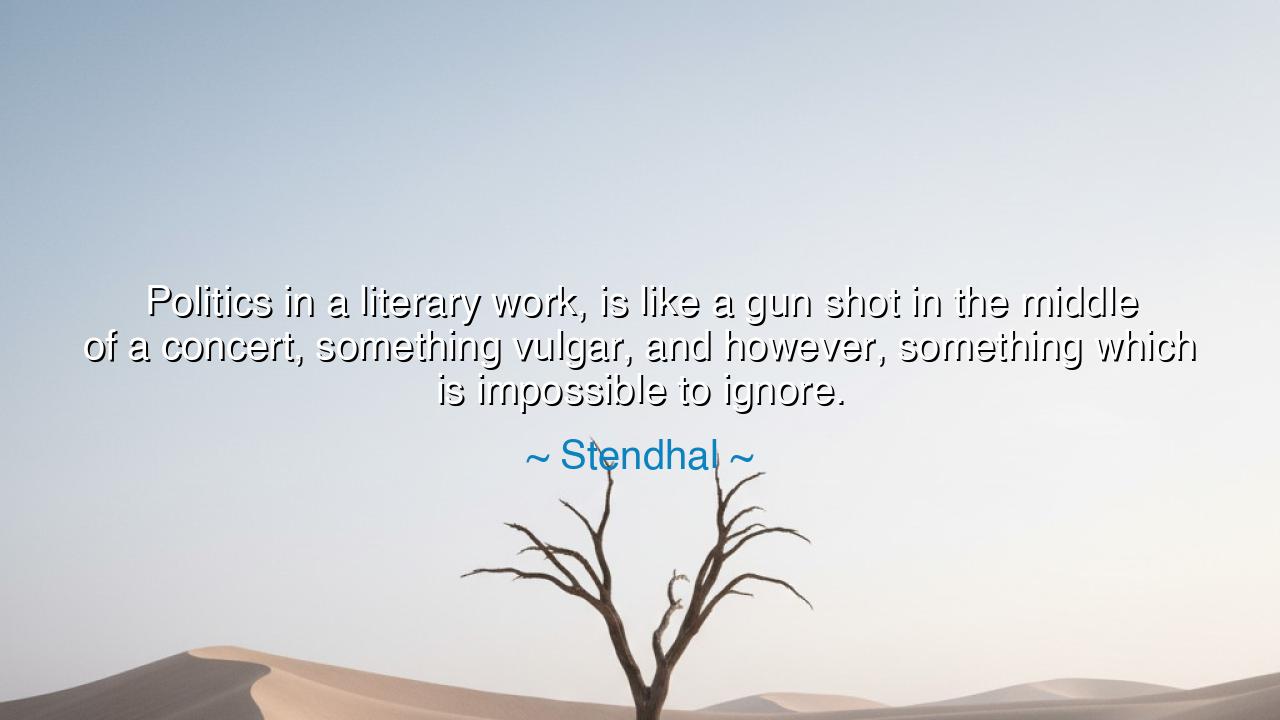
Politics in a literary work, is like a gun shot in the middle of
Politics in a literary work, is like a gun shot in the middle of a concert, something vulgar, and however, something which is impossible to ignore.






O children of the future, heed the words of Stendhal, whose deep insight into the human condition still resonates through the ages. "Politics in a literary work, is like a gunshot in the middle of a concert, something vulgar, and however, something which is impossible to ignore." With these words, Stendhal reveals the profound clash between the art of literature and the gritty reality of politics. Politics, when introduced into a work of literature, disrupts the delicate harmony of thought, emotion, and beauty, much like a sudden gunshot shattering the serenity of a musical performance. And yet, just as the gunshot cannot be ignored, so too does the presence of politics in a story demand our attention, even if it feels crude and out of place.
In the ancient world, the Greeks understood the power of art and politics, often blending the two in their tragedies and comedies. Sophocles, for example, wove themes of political power and moral responsibility into his plays, yet always with a sense of balance and beauty. When the gods’ will was challenged by kings like Creon in Antigone, the tension between personal power and moral duty became the heart of the drama. Though politics was ever-present in Greek tragedy, it was not thrust into the foreground in a way that jarred the audience; rather, it was subtly embedded in the human condition, drawing the viewer into the story. Stendhal’s words remind us that the clash of these worlds—art and politics—can be deeply unsettling, yet it cannot be overlooked.
Consider also the tale of Shakespeare’s Julius Caesar, where politics is thrust to the forefront of the narrative, shaking the audience to its core. The play tells of the downfall of a great leader, a tale of ambition, betrayal, and moral conflict that reflects the volatile nature of politics itself. The gunshot in the play is not merely a symbol of political assassination, but a profound disruption of the natural order, much like the sudden introduction of politics in a literary work. Just as the assassination of Caesar shakes the entire Roman world, so does the political drama in literature rattle the minds of the audience, forcing them to confront uncomfortable truths.
In modern times, the works of George Orwell—particularly 1984—serve as a stark example of how politics in literature cannot be ignored, no matter how much it might disrupt the harmony of the narrative. Orwell’s dystopia, with its totalitarian regime and constant surveillance, injects politics directly into the heart of the story, creating a tension that cannot be dismissed. Though the politics of Orwell’s world are deeply unsettling and vulgar, they are also impossible to ignore, for they reflect the very real dangers of unchecked power and control. Like the gunshot in the concert, Orwell’s work forces the reader to confront the harsh realities of political manipulation.
O children, let the wisdom of Stendhal and the great writers of the past guide you in your understanding of literature and politics. Politics, though sometimes jarring and disruptive in a literary work, holds a mirror to the real world and demands attention. Just as a gunshot in the middle of a concert shocks us, so too does the intrusion of politics into literature make us face the uncomfortable truths about power, corruption, and human nature. Let us not shy away from this disruption, but instead, embrace it as a tool to understand the world more deeply. For in the clash between art and politics, we find the raw truths of our existence, truths that we must confront, no matter how uncomfortable they may seem.






TAToi A
While Stendhal paints politics as something vulgar and disruptive, I wonder if politics in literature can serve a deeper purpose. Can the 'gunshot' symbolize a necessary confrontation with reality, forcing readers to grapple with important social and political issues? Is there a way for politics to be woven into literature more seamlessly, so it feels less like an intrusion and more like an essential part of the story?
KNNguyen Kim Ngan
The comparison of politics to a gunshot during a concert speaks to the sharp, almost violent intrusion of politics into artistic realms. Is this an indication that politics, though often unwelcome in fiction, reflects the chaotic and intrusive nature of real-world politics? Does Stendhal suggest that politics is inherently disruptive to human experience, or does it merely reflect the overwhelming presence of political issues in everyday life?
KHDoan Khanh Ha
Stendhal’s analogy also makes me think about how much political messages in literature are often met with resistance or discomfort. Could it be that the gunshot in the middle of a concert represents an inconvenient truth, one that we cannot ignore, no matter how much we may want to? How do we, as readers, react to these disruptive political elements in literature—do we reject them, or do we face them head-on?
YNNguyen Yen Nhi
The idea of politics in literature being 'vulgar' and 'impossible to ignore' raises a challenging question: do we often view political themes as distractions rather than integral parts of the narrative? Should we embrace the 'vulgarity' of politics in literature, or is it better to keep politics separate from the art form? How much does the context in which a work is written influence how we perceive the political elements within it?
TM26:Nguyen Thi Tra My
I find this quote striking, especially because it reflects how often political themes can feel intrusive or uncomfortable in literature. But, is it possible that politics, even when seemingly out of place, brings a certain urgency or truth to a story? Does Stendhal’s analogy suggest that political themes in literature are only ever disruptive, or could they also add depth and complexity to a narrative?